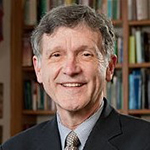 By Bill Leonard
By Bill Leonard
Some things never change, even as the times “get out of hand.” In the 1640s, Puritans Roger Williams and John Cotton engaged in a “tractarian debate,” fit for tomorrow’s “Morning Joe,” over politics, culture and of course religion in the new American land. Williams laid out his radical views of freedom in a complex treatise titled, The Bloudy Tenent of Persecution, for the cause of Conscience, written in 1644. Cotton responded with a 1647 volume called, The Bloudy Tenent, Washed and Made White in the Bloud of the Lambe, to which Williams answered in The Bloudy Tenent, Yet More Bloudy (1652).
For Cotton, the brilliant preacher-theologian, New England was clearly a Protestant commonwealth, whose biblically renewed witness would be a “city set on a hill,” mirroring true gospel faith and practice. As he saw it, this Christian culture must be protected at all cost, by rules as old as Scripture. Cotton warned: “Therefore, by the ancient laws of that unchangeable God that thought it insufferable in those days, [God] thinks it insufferable now that priests and Jesuits should bring in other altars, other meditations and mediators, as prayers of saints and angels; the Lord looks at it as deeply meritorious of a bloody death, as in former times. He is the same God, and His zeal and jealousy is deeply provoked against the like kind of viciousness now as it ever was then. …” Let in the Catholics and “viciousness” will reign. Government must keep them out.
For Cotton and other Puritan divines, dangerous, “insufferable” religion must be resisted, in both church and state. Cotton insisted that “if a man hold forth and profess any error, or false way to the disturbance of Civil Peace, he may justly be punished according to the quality and measure of the disturbance. …” Indeed, in a 1941 essay in Church History, Roger Davis wrote that for the Puritans, “God would abandon the society that permitted impiety and injustice to flourish in its bounds, which is why enforcing religious uniformity was so paramount a social goal among the Puritans. Laxity in matters of religion would displease God and threaten the removal of God’s good pleasure.”
John Cotton and his ilk seemed reincarnated in the recent words of Franklin Graham after a young American Muslim shot five soldiers at recruiting offices in Chattanooga, Tenn. Graham posted: “We are under attack by Muslims at home and abroad. We should stop all immigration of Muslims to the U.S. until this threat with Islam has been settled. Every Muslim that comes into this country has the potential to be radicalized — and they do their killing to honor their religion and Muhammad. During World War 2, we didn’t allow Japanese to immigrate to America, nor did we allow Germans. Why are we allowing Muslims now?”
Graham’s reference to the Japanese led some to wonder if he was implying internment for Muslims already in the U.S., a parallel practice to actions taken against Nisei (Japanese-Americans) in World War II.
Roger Williams’ views differed considerably with those of John Cotton (and, it would seem, Franklin Graham). Roger Davis cited Williams’ comment that religious uniformity was “destructive to the civil peace and welfare of all kingdoms, countries and commonwealths.” As Williams saw it, “true civility and Christianity may flourish in a state or kingdom, notwithstanding the permission of diverse and contrary consciences.” He wrote that neither church nor state was to encroach upon the “consciences of the Jews, nor the consciences of the Turks [Muslims] or Papists [Roman Catholics], or Pagans themselves excepted.” For Williams, much of Christian history involved persecution against heretics and non-Christians, practices that he said were “painted over with the vermillion of mistaken Scripture. …” Almost 500 years later, our country seems packed to the rafters with “contrary consciences,” religio-cultural divisions that stretch from Sunday mornings, to presidential campaigns, to ceaseless shooting rampages in public “safe spaces.”
Franklin Graham’s remarks on Muslim immigration were in response to one of three mass shootings that occurred during a four-week period in the summer of 2015. One brought death to nine African Americans at a prayer meeting; another killed five at neighborhood military recruiting offices, while another took two lives in a local movie theatre. The shooters included a radicalized racist, a radicalized Muslim and a violent right-winger, each with apparent mental issues. But each was able to secure the necessary firearms, no questions asked. Before we start restricting Muslims, might we talk more specifically about restricting firearms, at least making it difficult for terrorists, whatever their ideology, to secure them?
The religious pluralism that alarmed John Cotton (and Franklin Graham?) and which Roger Williams anticipated, has overtaken us, evident in our “contrary consciences,” and sometimes engendering violence that would put our 17th-century Puritan forebears to shame. Roger Williams wrote of his era: “The truth is the great Gods of this world are God-belly, God-wealth, God-honour, God-pleasure, &c.”
If we’d just add “God-guns” then his description would (sadly) fit our America quite well.
